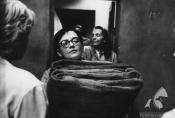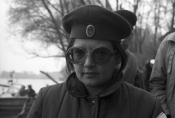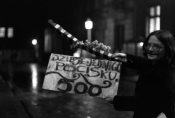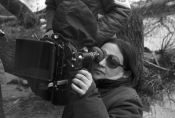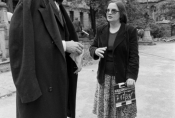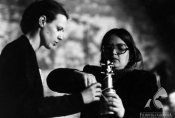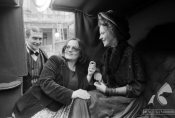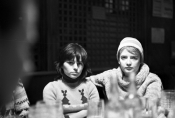Agnieszka Holland
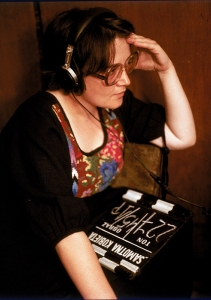
Film director, stage and television writer, actress, translator. She was born on November 28, 1948 in Warsaw. She graduated from the Directing Department at FAMU in Prague (1971). Her diploma film was Grzech Boga/ Jesus Christ's Sin (1970), inspired by the prose of Isaac Babel. She entered the film industry as an assistant director to Krzysztof Zanussi on the set of Iluminacja/Illumination (1973). Her own directorial debut was a television film Wieczór u Abdona/Evening at Abdon's (1975), a lyrical adaptation of stories by Iwaszkiewicz, set in the 1920s. Before she made her first full-length feature film, namely Aktorzy prowincjonalni/Provincial Actors (1978), she collaborated with other artists in two joint projects: Obrazki z życia/Pictures from Life, contributing the novella Dziewczyna i "Akwarius”/A Girl and Aquarius (1975) – the story of a teenage girl who runs away from home to follow her music idol, and Zdjęcia próbne/Screen tests (1976) – co-directed with Jerzy Domaradzki and Paweł Kędzierski – an interesting story about a young couple trying to get a part in a film. She also made two contemporary psychological dramas for television: Niedzielne dzieci/Sunday Children (1976), which addressed the issue of adoption, and Coś za coś/ Something for Something (1977) – an in-depth study of a married couple who choose not to have children.
Aktorzy prowincjonalni/ Provincial Actors (Grand Jantar in Koszalin, FIPRESCI award at Cannes), a shrewd tale of a provincial theatre troupe rehearsing Stanisław Wyspiański’s play Wyzwolenie/ Liberation under a renowned director from Warsaw, is without doubt one of the most interesting debuts in the history of Polish cinema; it is also one of the greatest achievements of the cinema of moral anxiety at its apex in the late 1970s and early 1980s. Representatives of that genre often employed a popular rhetorical figure – pars pro toto – to address the Polish reality of that era. For viewers, it was clear that the film Aktorzy prowincjonalni/ Provincial Actors was not just a story of local thespians, just as Wodzirej/Top Dog (1977) by Feliks Falk, another model example of the cinema of moral anxiety, was not simply an analysis of the life of a Polish entertainer. Another film by Agnieszka Holland – Gorączka/Fever (1980, Golden Lions in Gdańsk, Silver Bear for Barbara Grabowska for the female lead in Berlin, 1981) – is an impressive adaptation of Historia jednego pocisku/The Story of One Bullet by Andrzej Strug. It is set during the revolution of 1905. In an underground laboratory, a bomb is made, which then brings misery on anyone who comes into contact with it... Holland’s next film, the TV drama Kobieta samotna/A Lonely Woman (1981, Special Award and acting awards for Maria Chwalibóg and Bogusław Linda in Gdynia 1988), is set in a different era, but the mood remains the same, more and more depressing. This story of the love between two social outcasts – a single mother working as a postwoman and a young crippled man living on a disability pension – is one of the bleakest portrayals of life in socialist Poland.
Martial law found the director abroad. She decided to stay there which meant that the military authorities considered her an enemy of the socialist motherland. She made her subsequent films in exile, in Germany – Gorzkie żniwa/Bitter Harvest (1985); France – Zabić księdza/To Kill a Priest (1988), Europa, Europa (1990), Olivier, Olivier (1991), Całkowite zaćmienie/Total Eclipse (1995); in the United States and Canada (often in co-production with Western film studios) – The Secret Garden (1993), Washington Square (1997), The Third Miracle (1999), Shot in the Heart (2001), The Healer (2002), and Copying Beethoven (2005). Holland has also directed a number of episodes of popular American television series, including The Wire, Cold Case, Treme. In 2009, together with her daughter Kasia Adamik and in co-production with Czech, Slovak and Hungarian film studios, she returned to Polish cinema with her Janosik. Prawdziwa historia/Janosik. The True Story. Two years earlier, in collaboration with her daughter, sister Magdalena Łazarkiewicz and Borys Lankosz, she made the successful contemporary political drama series Ekipa/Prime Minister. A Polish-Canadian-German coproduction W ciemnosci/In Darkness (2011), a drama about a petty thief from Lviv helping to hide a group of Jews from the ghetto in the sewers, brought her an avalanche of awards (including Gdynia, Mar del Plata, Valladolid), including an Oscar nomination (2012). Holland is also the author of scripts filmed by artists, including Anna (1987), an American film directed by Yurek Bogayevicz, and Korczak (1990) by Andrzej Wajda. Her acting credits include Blizna/The Scar (1976) by Krzysztof Kieślowski and Przesłuchanie/Interrogation (1982) by Ryszard Bugajski.
She was awarded the Commander's Cross with Star of the Order of Polonia Restituta (2011) and the Gold Medal for Merit to Culture – Gloria Artis (2008). She was also honoured with a lifetime achievement award at the festival in Las Vegas (1999), a special Eagle award for “her artistic career, first in Poland, and then abroad" (2002), a Super Wiktor award for lifetime achievement (2008), the Jan Karski Freedom Award (2012), the Tadeusz Kotarbiński Medal of the Polish Academy of Sciences (2013), the Medal of St. George, awarded by the editors of “Tygodnik Powszechny" weekly for “spiritual restlessness and searching for artistic expression of it" (2013), as well as many other prestigious awards.
Jerzy Armata
Selected filmography
-
1978
PROVINCIAL ACTORS
-
1980
FEVER
-
1981
A LONELY WOMAN
Articles
-
About "Fever"
Agnieszka Holland
Faces of Agnieszka Holland. Editor: Krystyna Zamysłowska, Mieczysław Kuźmicki, Publisher: Muzeum Kinematografii w Łodzi, 2013
-
About "Fever"
Bogusław Linda
Faces of Agnieszka Holland. Editor: Krystyna Zamysłowska, Mieczysław Kuźmicki, Publisher: Muzeum Kinematografii w Łodzi, 2013
-
Laudation for Agnieszka Holland
Grzegorz Jankowicz
Faces of Agnieszka Holland. Editor: Krystyna Zamysłowska, Mieczysław Kuźmicki, Publisher: Muzeum Kinematografii w Łodzi, 2013
-
Head of Medusa, or realism in films of the Cinema of Moral Anxiety
Marcin Maron
„Kwartalnik Filmowy” – Special Issue 2013: “Polish Film Scholars on Polish Cinema”
